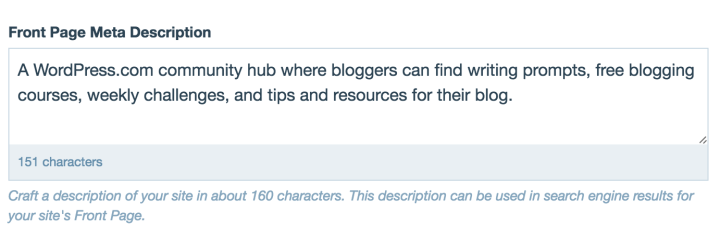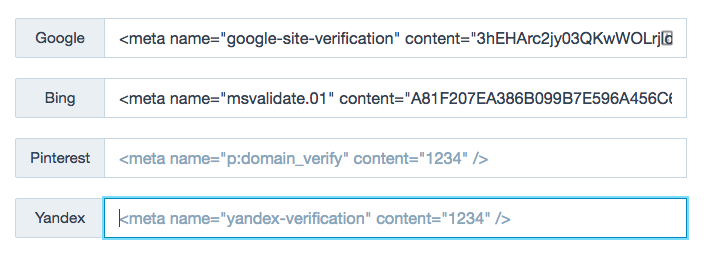WordPress.com has always taken care of your site’s search engine optimization (SEO) behind the scenes. Whether you have a free site or paid plan, we index your posts and pages so that the Googles and Bings of the world can easily find them. Many of you, however, have requested more hands-on control over your site’s SEO — so we’re thrilled to introduce a new SEO settings panel to your dashboard.
When it comes to attracting viewers via search engines, nothing beats publishing high-quality posts on a regular basis. But there are also a number of technical settings that can have an impact, and our new panel gives you easy access to and control over these settings.
When you’re working on your site in the WordPress.com dashboard (access it by going to My Sites in the top-left corner of the screen), head to the Settings page and you’ll see a new SEO section.

This section contains three items: Front Page Meta Description, Site Verification Services, and XML Sitemap. Read on to learn how they can help with your site’s visibility.
Front Page Meta Description
For the first time on WordPress.com, you now have the ability to edit the meta description that search engines detect for the front page of your site. Previously, we used the site’s tagline as the front page meta description.
Meta descriptions are a general overview of the contents of your site. Search engines sometimes use this information to display a description of the site for specific searches, so adding one allows you to craft a message that emphasizes your site’s content and purpose.
Still not quite sure what a meta description does? Here’s an example of how it works on our blogging-resources site, The Daily Post:

Text entered into the Front Page Meta Description box.

A Google search result showing the meta description.
As for the rest of your pages and posts, meta descriptions are pulled from the excerpt field.
Site Verification Tools
WordPress.com comes with built-in stats that give you ample information about your traffic. If you’d like even more stats, some search engines and social networks offer additional “webmaster tools” that may complement the data you see here.
We’ve made it easier for you to verify your site with several services (for detailed instructions on site verification, read our step-by-step instructions). All you need to do is copy the HTML verification tag from any of the platforms listed below, and paste it into the corresponding field:

Site Verification Tools
We currently support the following services:
XML Sitemap

Your site has always had an XML sitemap, but now you’re never more than a couple of seconds away from finding it!
Sitemaps are special-format pages that let search engines know what pages exist on your site and where to locate them. After you’ve verified your site using Google, Bing, or Yandex’s webmaster tools, you can submit your sitemap to those services so that search engines can easily find all the pages on your site.
Going through this step may help search engines index your site more quickly, as well as establish your authorship of original content in case your posts get syndicated or shared elsewhere on the web later on. Once you’ve added your sitemap, some of these services (including Google and Bing) will also be able to provide you with more information on your site’s performance.
- Submit a sitemap to Google Search Console
- Submit a sitemap to Bing Webmaster Tools
- Submit a sitemap to Yandex
Take Charge
With access to more SEO settings than ever, you have the ability to take charge of your site’s search engine success. If you’re interested in learning more about SEO on WordPress.com, visit our previous articles on the topic at The Daily Post, or check out some of the most frequently asked SEO questions.
Filed under: Dashboard, Features, New Features, Stats, WordPress.com
![]()
